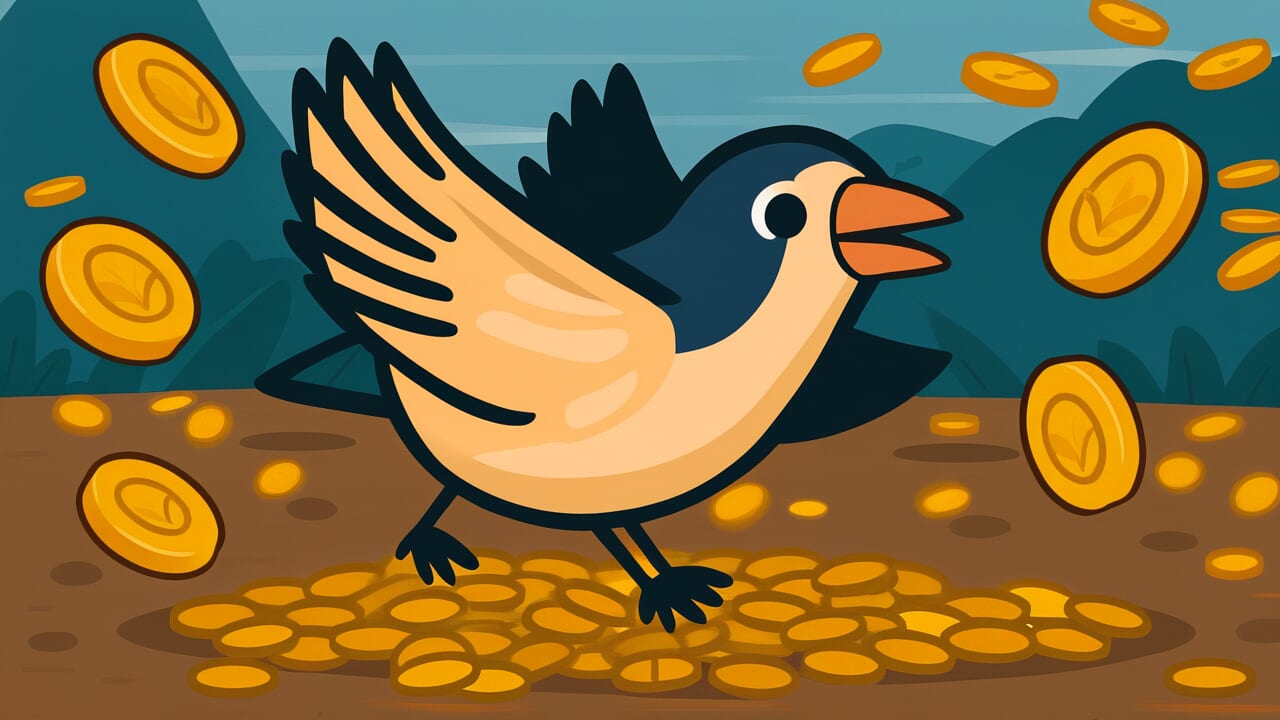How to Read “With money, even flying birds will fall”
Kane sae areba tobu tori mo ochiru
Meaning of “With money, even flying birds will fall”
This proverb is a sarcastic expression about the belief that money can make anything possible. It suggests that with enough money, you can gain power so great that even birds flying freely in the sky will fall.
The saying shows the tremendous influence that money holds in society.
People use this proverb when they witness situations where money makes the impossible possible. It applies when money moves people’s hearts or changes how society works.
For example, you might hear it when money matters more than actual ability or character. Or when wealth turns impossibilities into realities.
However, this expression carries clear sarcasm. It doesn’t celebrate the fact that money can do anything.
Rather, it criticizes such situations. Even today, people use this phrase when viewing the reality of money’s influence with a cold, critical eye.
Origin and Etymology
No clear records exist about the exact origin of this proverb. However, looking at how the phrase is constructed reveals an interesting background.
The expression “flying birds will fall” originally described someone at the peak of their power. It meant having such overwhelming force that even birds flying freely would fall from the sky.
By adding “with money” as a condition, the phrase shows that money is the source of this great power.
After the Edo period, commerce developed and a monetary economy spread throughout Japan. People became widely aware that money’s power could move society.
As Japan shifted from a samurai era to a merchant era, money began to speak louder than social status or family background.
This proverb likely emerged against this social change. It expresses with irony the reality that money can make anything happen.
By deliberately adding “with money” to the dignified phrase “flying birds will fall,” the saying embeds a critical view of money-centered values.
Usage Examples
- That company has such momentum that with money, even flying birds will fall—they can apparently get any permit they want
- They say with money, even flying birds will fall, but it makes me sad to think this world ultimately depends on money
Universal Wisdom
This proverb has endured because it sharply captures the dual nature of money in human society. Money is certainly a useful tool that opens many possibilities.
But it also carries the danger of distorting human values and relationships.
Throughout history, humans have been fascinated by the power of visible wealth. Money seems to bring security, expand choices, and even earn respect from others.
Yet people have always maintained caution about relying too much on money’s power. Experience has taught us that relationships built on money aren’t genuine, and positions gained through wealth are fragile.
The irony embedded in this proverb sees through this human truth. The expression about gaining power to make flying birds fall seems to praise money’s omnipotence.
But it actually does the opposite. It criticizes substituting external monetary power for influence that should come from ability and character.
Money’s power has always been formidable in human society. But this proverb teaches the importance of viewing it critically rather than accepting it blindly.
The wisdom to distinguish what money can and cannot buy is the key to living a truly rich life.
When AI Hears This
The probability of a flying bird falling, considering only physical laws, is nearly zero. Birds use muscles to expend energy and stay airborne against gravity.
This is a typical example of life maintaining local order—a low-entropy state. But when “money” intervenes, this natural state collapses.
What’s interesting is that money itself is an extremely low-entropy substance. Coins and bills are highly ordered information that human society created using enormous energy.
Through mining, refining, and minting, they emerge as compensation for greatly increasing Earth’s overall entropy. Money concentrates order at hand by generating massive disorder elsewhere.
Using money to make birds fall seems to overturn natural laws. But actually, it merely consumes the low-entropy energy stored in money to collapse the separate low-entropy state of bird flight.
For example, luring with food or hiring hunters releases the order accumulated in money to destroy order elsewhere. Ultimately, the second law of thermodynamics holds for the entire system, and entropy continues to increase.
Lessons for Today
This proverb teaches us to understand money’s power correctly and maintain an appropriate distance from it. While money has strong influence, we must keep the perspective that it isn’t everything.
Modern society tends to emphasize financial success as life’s goal. But the ironic tone of this proverb reminds us that money’s power has limits.
Money opens many doors, but truly valuable things—trust, love, personal growth—cannot be bought with money alone.
What you should value is having your own values that aren’t swayed by money’s power. Pursuing financial wealth isn’t wrong, but be careful not to make it your only measure.
Don’t forget to cherish values that money can’t buy: integrity, compassion for others, and your own beliefs. By doing so, you can walk a truly rich life path.
You’ll be able to use money’s power without being controlled by it.



Comments